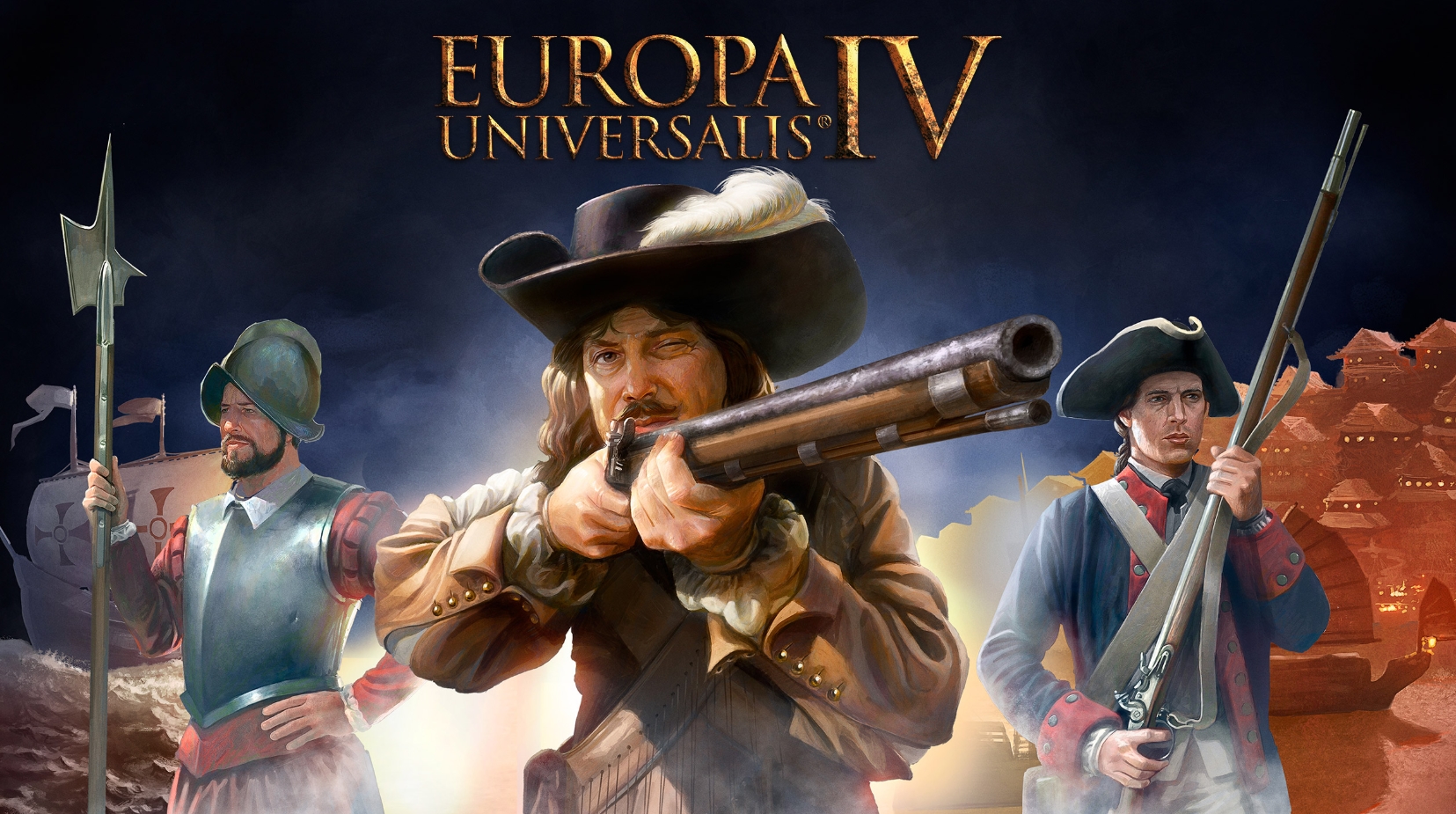
Europa Universalis is not just a grand strategy game, but a true legend among games of the genre. This is the longest-running series from Paradox Interactive, and this alone deserves respect. In this review, I want to take a detailed look at two key aspects of the game – military affairs and diplomacy.
I played all four parts of Europa Universalis and, as a long-time fan of the genre, spent many hours in each of them. The first game was released back in 2000, and since then the series has come a long way. With each new release, it became deeper, more complex and interesting. Swedish developers from Paradox really know their business – almost every innovation was the very element that was sorely lacking in the previous parts.
In this review, I will focus on Europa Universalis IV and its add-ons. The fourth part received high marks (on average 8.5+ out of 10) from gaming publications and the community. It can be said that Paradox managed to go beyond its niche and create not just a “game for the chosen ones”, but a truly popular project. EU4 has many advantages, and the developers deserve praise. However, in addition to the admiration, I also have a critical view of the game. After all, even after all the updates, it still has enormous, but largely untapped potential.
Table of Contents
Game world: large-scale map and historical era Free Steam Account
Let’s start with the basics, which, despite all the innovations, remain unchanged from one part of Europa Universalis to another. The game is often called a “real-time strategy”, but this can be misleading. Unlike classic RTS, where the speed of decision-making is important, in Europa Universalis you can pause the game and calmly think about the next step.
All mechanics are built around a world map divided into many provinces and sea regions. With each new part, the number of these territories grew, and by the time Europa Universalis IV was released (with a full set of add-ons), the world in the game had become more detailed than ever. Chronologically, the action covers the period from the late Middle Ages to the end of the Napoleonic Wars. You can play for any state that existed at that time, and there is no clear victory condition here. This makes the game a kind of “sandbox” where you decide what to strive for.
But the lack of a final goal does not prevent most players from setting a specific task for themselves – world domination. It can be achieved in a variety of ways: war, diplomacy, economics, colonization, or technological development. With each new release, the series has undergone significant changes, and Europa Universalis IV is no exception. But before we delve into the details, it is worth highlighting one key feature that changed the game on a fundamental level.
Previously, it did not matter much who ruled the country. The monarch’s talents only provided small bonuses to technology development and occasionally influenced in-game events – and that was their role. In Europa Universalis IV, the situation is radically different. The ruler’s skills directly affect the growth of three key resources – administrative, diplomatic, and military points. These points are needed for many actions: from researching technologies and adopting national ideas to integrating new territories. In addition to the ruler himself, their generation is influenced by advisers (the higher their cost, the more points they give) and a number of other factors. Now that we have dealt with this important detail, let’s take a closer look at all aspects of the game.
Get a free Steam account and enjoy games without spending money!
Military Affairs in EU: Strategies, Battles, and Fortresses
The Europa Universalis series proves once again: the history of mankind is, alas, the history of wars. Peaceful development? A good idea, but in practice it is almost a utopia. There will always be someone who threatens you or your allies. The military mechanics in the new part have become not only deeper, but much more realistic. There are many changes, but there are several that really turn the usual gameplay upside down.
Now, if an army has already passed more than half the way, it cannot be stopped or abruptly turned back. This seems like a trifle, but in fact it is a strategic innovation. Finding the ideal position for a general battle, cunning maneuvers in the mountains, intercepting an enemy on a river – all this turns into a game of chess, where a miscalculation can cost too much. This is especially interesting in multiplayer: here every step can be decisive. The results of individual battles are no longer so critical. The defeated army does not simply retreat to the nearest province, as it was in EU3, but goes to a safe distance. Defeat the enemy in two blows? Now it is far from always possible.
Previously, fortresses were more of a passive barrier – build up the entire country and hope that they will delay the enemy. In EU4, everything is different: now each fortress controls neighboring provinces that do not have their own fortifications. This adds depth to the strategy. Firstly, if the fortress is under your control, you can automatically capture adjacent territories (if they are not protected by enemy troops). Secondly, fortifications now really hinder the enemy’s movement. And most importantly, they affect the battles themselves: if the battle takes place in a province with your fortress, your troops receive defensive bonuses. Imagine several fortresses in the mountains: they not only slow down the enemy’s advance, but also make you an almost impregnable fortress. Of course, there is a downside – building fortresses is expensive. Want to reliably protect your borders? Prepare impressive resources.
A new stat, Army Professionalism, adds another layer of depth. It can be increased with drill, which allows troops to train in peacetime. This costs money: soldiers receive full pay during training. The higher the professionalism, the better the army fights: it deals more damage and takes fewer casualties. In addition, high training improves the combat effectiveness of the entire country, opening up additional military options. But there is a catch: the more professional your army, the fewer mercenaries you have available, and they cost more. This is a reference to the historical transition from mercenary troops to regular armies. Was this mechanic successful? Debatable. Creating a professional army is long and expensive, and mercenaries, despite their shortcomings, remain very useful. Sometimes it is easier to recruit temporary soldiers than to build elite troops for years.
Diplomacy in EU4: What has changed?
War is war, but, as Hugo Grotius said, any war is waged for the sake of peace. In Europa Universalis IV, diplomacy has undergone major changes, making interactions between countries more logical and understandable. Let’s figure out what exactly has changed. Now you don’t have to guess why France rejects an alliance, even if relations with it are ideal, or why Turkey refuses to sign a seemingly mutually beneficial peace. The new diplomacy window displays all the factors that influence the decisions of artificial intelligence, and in most cases they look quite logical. EU4 now has limits on the number of countries with which you can maintain close diplomatic ties – alliances, dynastic marriages, and vassal treaties. The limit can be exceeded, but this will lead to a decrease in the growth of diplomatic points and reduce the chances of new agreements. However, it is not fixed and depends on national ideas, political course and random events.
One of the main innovations was the introduction of a system of official rivals. Each state can choose up to three opponents, and the AI will do the same. This innovation gives several advantages:
- Diplomatic relations have become more predictable – a common enemy makes you potential allies, and a country in conflict with your ally is unlikely to cooperate with you.
- Victories over rivals bring bonuses in the form of diplomatic influence points (Power Projection), which provide additional advantages.
- Capture of territories from rivals has become easier in terms of diplomatic consequences.
It is important to remember that you can only choose a power in the same “weight category” as a rival. If the balance of power changes, the rivalry status is automatically cancelled.
Managing dependent states has become deeper and more convenient. In the new vassal interface, you can:
- Control their behavior in wars,
- Change tax policy,
- Change vassal agreements (for example, turn a vassal into a march, which will reduce your income, but increase its defense capability).
At the same time, vassals are now much more likely to strive for independence, especially if they are strong and the relationship with the overlord leaves much to be desired. If a vassal declares its desire for freedom, other countries may support it. For example, it is now much more difficult to keep the Duchy of Lithuania under Polish rule or to preserve the Kalmar Union for Denmark.
Diplomats are now responsible for espionage in EU4, rather than special agents. The core mechanic is fabricating claims to other people’s territories, which provides a legitimate pretext for war. Over time, the list of espionage actions expands – you can ruin the enemy’s reputation, undermine their trade, or support the rebels. However, there is a flaw here: if your spy is exposed, there are no serious consequences, which makes the system less realistic and boring. Finally, EU4 has a Great Power system inspired by Victoria. Getting into the top 8 depends on the size of the state, the number of dependent countries, the level of development of the provinces, and technological progress. Great Power status gives special privileges, including the ability to interfere in other people’s wars. However, this mechanic in the game is not as developed as in Victoria, and mainly serves to make the player feel like an influential ruler.
Diplomacy in EU4 has become more transparent, logical, and interactive. The developers have improved the interface, added mechanics of trust and rivalry, deepened vassal management and made espionage more flexible. However, there are some shortcomings, such as weak consequences for espionage activities and an insufficiently developed system of great powers. In any case, the game has become much more interesting now, and diplomacy is a more important part of the strategy.
Economy in Europa Universalis IV
One of the main things that immediately catches the eye in the economic system of Europa Universalis IV is a major change in the mechanics of trade. Now it plays a much more significant role in the economy of states. If earlier merchants simply competed with each other for a place in trade centers, knocking out rivals or losing the fight, now the developers freed players from this routine micromanagement. Merchants remain in trade nodes until you decide to recall them. They can either directly earn for your treasury or redirect trade flows further along the route. The historical accuracy of trade routes in the game sometimes causes controversy, but the mechanics themselves work logically and are exciting. In addition, trade now brings much more money than in previous parts. Ignoring this aspect is not the best strategy if you want prosperity for your state.
Your market share in each trade node is determined by trade power. It is influenced by many factors, but the key role is played by control over the provinces related to this node. Moreover, not all lands are equally important – possession of the mouth of a river or a strategically located city can change the situation dramatically. You can also increase your trade power by constructing special buildings. Another important factor is the fleet. In coastal trade nodes, light ships performing the “Protect Trade” mission significantly strengthen your position. But enemy blockades, on the contrary, can greatly weaken your trading capabilities. If you play as a trading power, for example, the Netherlands or Venice, you cannot do without a powerful fleet – otherwise your merchants will be ineffective and defenseless.
Colonization in Europa Universalis IV: A New Age of Discovery
The development of new lands is a key feature of the Modern Age, and the Europa Universalis series has always paid special attention to colonization. However, if in the previous parts of the game the overseas possessions in America, Africa and Asia differed little from each other, then in EU4 this process has become much more diverse and deeply developed. The exploration of America in the game begins, as in history, at the end of the 15th century. For those who like surprises, the developers have added a random generation function for the New World. Instead of the usual outlines of North and South America, you can get a completely new continental landscape with an unexpected arrangement of islands and continents. If you prefer historical accuracy, random generation can be easily disabled in the settings.
Viceroyalties, special autonomous entities, appeared on the territory of America (as well as Australia). When you control five cities in one colonial region (for example, in Brazil), they form a dependent state. This colony will be able not only to expand its territories, but even to declare wars. The more regions you develop, the more viceroyalties you will have, which means more income from duties and additional allies in wars. But it’s not that simple. The more your colonies develop, the more they strive for independence. If the metropolis turns out to be weak or unable to maintain control, prepare for possible uprisings and power struggles.
Not all colonial possessions become viceroyalties. Some territories can be transferred to trading companies, which provide you with economic advantages. Provinces under their control receive their own line of buildings and significantly increase your trade power in the region. This is especially beneficial in resource-rich parts of Africa and Asia. A developed colonial empire provides tangible benefits. More viceroyalties and trading companies mean more bonuses: from an increased number of merchants to an increase in the army and navy limit. Colonial powers receive enormous potential for expansion and dominance. If your country is in an advantageous geographical position, has the necessary resources and national ideas (like Spain, for example), not joining the colonial race would be a real mistake.
System Requirements for Europa Universalis IV
To fully experience the grand strategy gameplay of Europa Universalis IV, your system needs to meet specific requirements. The table below outlines both the minimum and recommended specifications necessary for optimal performance.
How to Play Europa Universalis IV for Free on Steam via VpeSports
If you dream of conquering the world in Europa Universalis IV without spending any money, we have a great opportunity for you! You can access the game for free through our platform using shared Steam accounts that already have Europa Universalis IV installed. To get started, head over to the VpeSports website and register an account. Once logged in, find the free steam account Accounts section, where you can select an account with Europa Universalis IV. Clicking on the desired account will give you access to its details and download instructions.
On the account overview page, you will find the Download button, as well as detailed instructions on how to access the game. We value your feedback, as it helps us improve the service. Remember that all comments are moderated, so if your review is not immediately approved, try to adjust it according to our recommendations. Once approved, our team will send the account details to your registered email.
To speed up the process, go to Telegram, and the support chat is here. Here you will not only be aware of all updates, but also get direct access to accounts for free play in Europa Universalis IV. The channel will also help you keep track of new patches, DLCs and important changes in the game.
If you have any difficulties with access, our website has a detailed guide “How to play for free – detailed instructions!“, which will help you understand all the nuances. Get ready for great achievements! Diplomacy, wars and trade await you in Europa Universalis IV!










Great Game I wish I could play it soon thanks guys
Thank you very much!! I was really looking forward to this game.
One of the best strategy game
Whether you’re throwing punches, grappling opponents, or trying to survive on moving platforms
Great Game I wish I could play it soon thanks guys
Can’t wait to play this game!
Great Game I wish I could play it soon thanks guys
Thank you, brothers, for everything that was smooth and wonderful.
thankss man i m the hardest fans of this series
i like this game, i will try this game soon